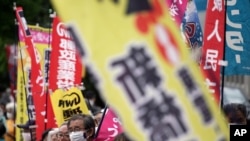The Japanese government has approved a plan to release millions of tons of radioactive water from the wrecked Fukushima nuclear power plant into the Pacific Ocean.
The plan was approved Tuesday during a meeting of Prime Minister Yoshihide Suga’s Cabinet. Tokyo Electric Power Company, the operator of the Fukushima Daiichi plant, will begin emptying 1.3 million tons of contaminated water into the ocean in 2022, when the plant’s storage tanks will be full.
Prime Minister Suga said the plan to release the water in the sea is an “unavoidable” part of decommissioning the Fukushima facility. TEPCO will filter the water to remove harmful nuclear isotopes and further dilute it before disposing of the water.
The plant became inoperable on March 11, 2011, when a 9.0-magnitude quake triggered a tsunami that swept across northeastern Japan before reaching Fukushima prefecture.
The high waves knocked out the plant’s power supply and cooling systems and led to a meltdown of its three reactors, sending massive amounts of radiation into the air and forcing the evacuation of hundreds of thousands of residents, making it the world’s worst nuclear disaster since the 1986 Chernobyl accident.
The disposal plan has come under intense criticism from local fishing communities near Fukushima, who fear the impact on marine life from the contaminated water. Regional neighbors China and South Korea have also criticized Tokyo’s plan, with Beijing calling it “irresponsible,” while Seoul says it could “bring a direct and indirect impact on the safety of our people and surrounding environment.” The foreign ministry summoned Japan’s ambassador hours after the announcement to lodge a formal protest.
But the U.S. State Department issued a statement on its website supporting Japan’s decision, saying it appears to be “in accordance with globally accepted nuclear safety standards.
Japanese Government Approves Plan to Release Radioactive Water from Fukushima Nuclear Plant
- By VOA News





